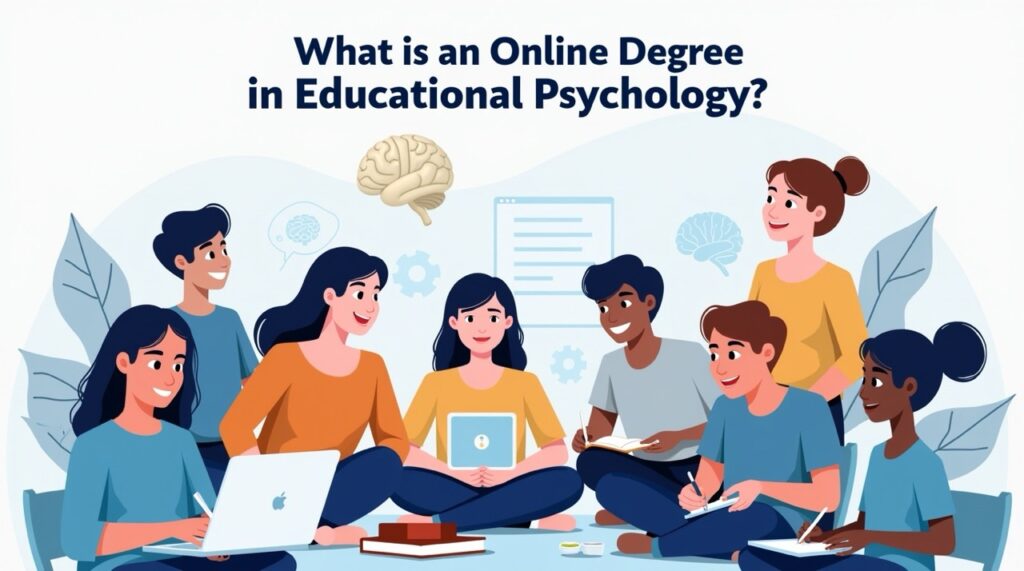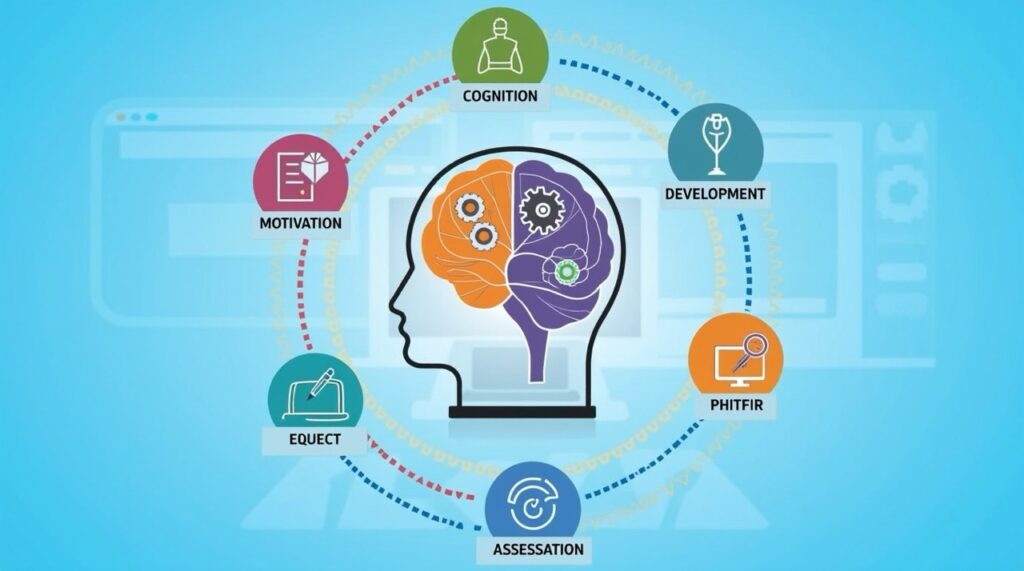Introduction
Education is a key part of personal and societal growth. However, learning is not the same for everyone. Some students grasp concepts quickly, while others need extra support. This is where educational psychology comes in. Educational psychology helps us understand how people learn and develop, making education more effective for all. If you are interested in this field, pursuing an online degree in educational psychology can be a great option. It equips students with the skills and knowledge to enhance learning outcomes in diverse educational settings.
What is Educational Psychology?
Understanding Educational Psychology
Educational psychology is a branch of psychology that focuses on how people learn. It studies teaching methods, learning processes, and how different factors affect education. This field helps educators, parents, and policymakers create better learning environments. By understanding cognitive and emotional development, educational psychology provides insights into optimizing learning techniques.
Importance of Educational Psychology
Educational psychology plays a crucial role in:
- Identifying learning difficulties and finding solutions.
- Developing better teaching strategies.
- Understanding student motivation and behavior.
- Creating inclusive learning environments.
- Supporting mental health and well-being among students to enhance academic success.
What is an Online Degree in Educational Psychology?

An online degree in educational psychology is a program that allows students to study the principles of learning and development through virtual classes. It covers topics such as cognitive development, motivation, instructional strategies, and psychological assessment. These programs use digital platforms to provide students with interactive and flexible learning experiences.
Types of Online Degrees in Educational Psychology
- Bachelor’s Degree: Provides foundational knowledge in psychology and education. It introduces students to key concepts such as human development and learning theories.
- Master’s Degree: Offers advanced understanding and specialization in educational psychology. Students gain practical experience and engage in research to apply theoretical knowledge.
- Doctorate Degree (Ph.D. or Ed.D.): Focuses on research and leadership in educational psychology. Graduates can work in academia, research institutions, or as policymakers to improve education systems.
Benefits of an Online Degree in Educational Psychology
Flexibility and Convenience
Online programs allow students to learn from anywhere at any time. This flexibility is perfect for working professionals, parents, and those with busy schedules. It enables students to balance education with personal and professional commitments effectively.
Cost-Effective Learning
Online degrees often cost less than traditional programs. Students save on travel, accommodation, and other expenses. Additionally, many universities offer financial aid and scholarships to online students.
Access to Quality Education
Many top universities offer online degrees in educational psychology. This allows students to learn from expert professors and access high-quality study materials. Online learning platforms also provide a wide range of resources, including digital libraries and discussion forums.
Career Advancement
An online degree can help professionals enhance their skills and qualify for higher positions in education, counseling, and research. Employers recognize the value of online education, especially when provided by accredited institutions.
Key Subjects in an Online Educational Psychology Program

Cognitive Development
Students learn how the brain processes information, solves problems, and develops memory skills. Understanding cognitive development helps in designing effective teaching strategies tailored to different age groups.
Learning Theories
This subject explores different theories of learning, such as behaviorism, constructivism, and social learning theory. These theories help educators understand how students acquire knowledge and skills.
Motivation in Education
Understanding what drives students to learn and how to keep them engaged is a key part of educational psychology. Educators use motivation theories to create engaging and effective lesson plans.
Psychological Assessment and Testing
This area focuses on evaluating students’ abilities, learning styles, and emotional well-being through various tests and assessments. These assessments help in identifying learning difficulties and developing appropriate interventions.
Special Education and Inclusive Learning
Educational psychologists study how to support students with special needs and create inclusive classrooms. Inclusion strategies ensure that every student receives equal learning opportunities, regardless of their challenges.
Career Opportunities with an Online Degree in Educational Psychology
An online degree in educational psychology opens doors to various career paths, including:
School Psychologist
School psychologists work with students, teachers, and parents to support students’ mental health and learning needs. They also provide counseling and intervention programs to address behavioral and emotional challenges.
Educational Consultant
Educational consultants help schools and organizations improve their teaching methods and curriculum. They analyze learning environments and recommend evidence-based strategies for improvement.
Academic Counselor
Academic counselors guide students in making the right educational and career choices. They provide advice on study techniques, time management, and overcoming academic challenges.
Instructional Designer
Instructional designers develop educational programs and training materials using psychological principles. They integrate technology and research-based methods to create engaging and effective learning experiences.
Researcher
Researchers in educational psychology study learning patterns and develop new teaching methods based on scientific findings. Their research contributes to improving education systems worldwide.
How to Choose the Right Online Degree Program

Accreditation
Ensure the program is accredited by a recognized education body. Accreditation guarantees quality education and acceptance by employers. It also ensures that the degree meets industry standards and requirements.
Curriculum and Specializations
Look for a program that offers subjects and specializations that match your career goals. Some programs offer concentrations in areas such as early childhood education, instructional design, or special education.
Faculty and Support Services
Check if the program has experienced faculty and offers student support services, such as academic advising and career counseling. Access to faculty members and peer support enhances the learning experience.
Cost and Financial Aid
Compare tuition fees and check if scholarships, grants, or financial aid options are available. Many institutions provide flexible payment plans to support students financially.
Internship and Practical Experience
Some programs offer internship opportunities, which provide hands-on experience in the field. Practical experience is essential for applying theoretical knowledge in real-world settings.
Steps to Enroll in an Online Educational Psychology Program
Step 1: Research Programs
Explore different universities and programs to find the one that best suits your needs. Compare their course offerings, faculty expertise, and accreditation status.
Step 2: Check Admission Requirements
Each program has different entry requirements. Common requirements include:
- High school diploma or bachelor’s degree (for advanced programs).
- Letters of recommendation.
- Personal statement or essay.
- Standardized test scores, if required.
Step 3: Apply for Admission
Complete the application process and submit necessary documents before the deadline. Ensure that you meet all the eligibility criteria for a smooth admission process.
Step 4: Apply for Financial Aid (if needed)
Look into scholarships, grants, and student loans to help with tuition costs. Many institutions offer flexible financing options to support students.
Step 5: Begin Your Studies
Once accepted, start attending virtual classes and engage in discussions and assignments. Staying organized and setting goals can help you succeed in your studies.
Conclusion
An online degree in educational psychology is a valuable option for those interested in understanding and improving learning and development. It offers flexibility, affordability, and diverse career opportunities. By choosing the right program and staying committed, students can unlock their potential and make a meaningful impact in the field of education. If you are passionate about helping others learn and grow, pursuing an online degree in educational psychology could be the perfect path for you. Graduates can contribute to creating better learning environments and improving education systems globally.